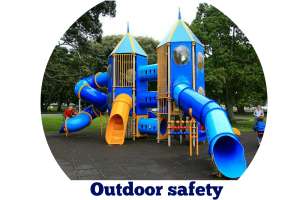We all have been given a mission to be spiritual companions to our children, grandchildren, and young friends. There are many blessings to be shared across the generations. We also can do more to respect and cherish children’s spirituality. How do we express it? Through creativity, sharing experiences, narrating stories, questions and much more. [Read more…]
Safeguarding your children against dangers on the playground
In our bid to get our children more outdoor play, we must also safeguard them against seemingly harmless outdoors. This article is does not intend to prevent you from sending your child outdoors to play, but to ensure that when you do so, proper safety precautions are undertaken to everybody has a good time.
How can you help your toddler to talk
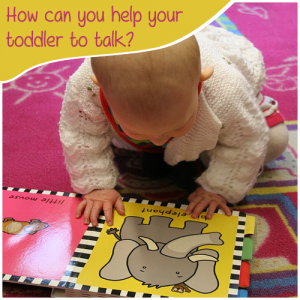 Remember the time when your baby used to turn its head in the direction of your voice? Not only do babies learn to recognize their mother’s voice right from the time they are in the womb,but they also have a natural interest in human voices. [Read more…]
Remember the time when your baby used to turn its head in the direction of your voice? Not only do babies learn to recognize their mother’s voice right from the time they are in the womb,but they also have a natural interest in human voices. [Read more…]
Children’s Day Celebrations in India
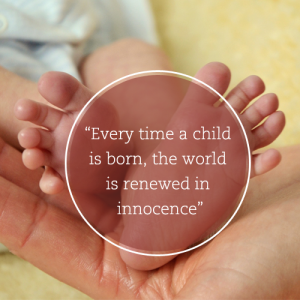 “Every time a child is born, the world is renewed in innocence”
“Every time a child is born, the world is renewed in innocence”
Hi, Everyone! Today is Children’s Day! Although we are too big for that, we still can enjoy it with our kids and teach them about the significance of this day. Children’s Day in Hindi is known as ‘Bal Diwas’ and is celebrated on the 14th [Read more…]
3 Reasons why it is important for your child to play in Mud
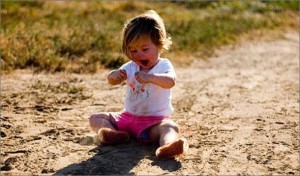
What is your child’s typical day like? I bet it includes loads of activities that involve art, craft,sports and study. Have you ever considered mud? I find children, even the very young ones, are always fascinated by mud. But our current lifestyle can elicit responses like, “Eww, not the mud, honey. It’s dirty” or “There are germs in there, you don’t want them on your hands!” [Read more…]
The Most Important Parenting Decision You Will Make. EVER!
If you are a parent, this is the most important message you will ever hear
Believe us, the following video will transform yours and your child’s life positively forever! It’s VERY EASY to make it a part of your family’s daily routine!
Please help us transform more lives and Make Living Fun!
YOU WILL MAKE THE WORLD A BETTER PLACE IF YOU SHARE THIS WITH OTHER PARENTS! PLEASE DO YOUR BIT! Thanks a Million!
Choosing age appropriate toys for kids of all ages
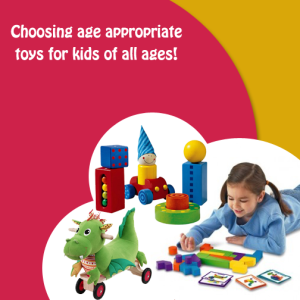
Before you set out to find the perfect toy for your child, you must understand that the best toy for the child is sitting right at home. That’s you! Yes, you are your child’s most interesting and nurturing toy in the whole wide world. But there are times when you can’t be with him/her full time. That’s when the other toys come in. But these should be reserved for play only when you can’t be around to play with your child.
Toys and games for newborn and babies:
You are your child’s best toy and playmate at this stage. She enjoys watching your face, movements, expressions and enjoys feeling your loving touch. Since babies at this age aren’t mobile yet, their eyes and ears are their window to the world. So make sure you talk to your baby as you move around the room. Get closer to the baby as often as possible as newborns can’t focus beyond 30 cms in the first few days of their life.
Babies at this age also love contrasting colors. So, getting colourful soft toys are a very good idea. They also love listening to sounds around them. Introduce them to music through musical mobile tunes or a baby rattle.
Once the baby learns how to reach for toys, you could get some interesting Knicks and knacks from around the house itself. Colorful paper and cloth books are a great option too!
Toys and games for preschoolers and toddlers:
Children at this age have started walking so pull-along toys are a great investment. To nurture the love of books, introduce soft cloth books with lots of images. Your child is also learning cause and effect so a wonderful game to play is peek-a-boo. Other options include a jack-in-the-box.
Provide plenty of outdoor play opportunities like a visit to the sandpit.
Your toddler will love playing with colors at this stage. Although they can’t hold a crayon yet, you could get toxin free finger paint and set them up on a play mat lined with newspapers. Sit back and watch as your toddler feels the gooey paint through her fingers and makes pretty art work on the paper.
Safe fun with water at this stage is an instant hit. If the weather is warm you could set up a paddle pool. In cold climes, stick to bath times for fun with water. Get lots of colourful squeezy toys and throw them in the bath tub with your child.
*Note: Never leave a child unattended near any water body, no matter how shallow.
Toys and games for school-age children:
Your child is completely capable of telling you which toys he/she finds interesting. You can use that as a guide while choosing toys.
Most children at this stage are keen on the latest technology toys. In today’s day and age it is not possible to completely exclude these types of games. Choose them wisely and weed out anything with violence in it. Limit screen time from early on.
Also popular at this age are construction sets, board games and art and craft toys. For outdoor play, you must invest in a safe bicycle. Other options include roller skates, skipping ropes and cricket.
Spending time playing with your children still rules the roost, even at this stage. So make sure that toys are not a substitute for quality time they could have spent with you.
What is causing your child’s cough?
 Cough and cold are the most common afflictions of children both young and old. Preschoolers suffer from coughs 3-8 times a year and older children up to 4 times. But there is a lot of confusion surrounding coughs and why they are caused. Here’s an article hoping to clear away some of those misconceptions and an easier (read less worrying) recovery.
Cough and cold are the most common afflictions of children both young and old. Preschoolers suffer from coughs 3-8 times a year and older children up to 4 times. But there is a lot of confusion surrounding coughs and why they are caused. Here’s an article hoping to clear away some of those misconceptions and an easier (read less worrying) recovery.
Coughs are usually caused by viruses. It is what we generally refer to as a viral infection. Since viruses are microorganisms that are neither alive nor dead (seriously!), it is impossible to eradicate them. Antibiotics are of no use on them. So basically, the infection has to run its course. It may last anywhere from 5 days to 12 days. A typical infection throws up symptoms like a head cold, runny or stuffed nose, sore throat, cough and sometimes a fever as well. The paediatrician may prescribe medicine to allay the symptoms of the viral infection (cold, cough, etc), but there is no cure for the infection itself.
However, there are cases when cough can be caused by allergies. If your child is allergic to dust mites, pollen, animal dander, etc, the cough may present itself whenever there is contact with the allergen. The only recourse is to administer antihistamines prescribed by your child’s paediatrician.
In rare cases, Pneumonia, an infection of the lungs can cause a persistent cough. It is also accompanied by difficulty breathing, a cold, fever body aches and chills. If you suspect pneumonia, it is a good idea to take your child to the paediatrician.
Bronchitis is another rare cause of a persistent and hacking cough several weeks after a viral infection. Bronchitis is an infection of the tubes carrying air to the lungs. This too can be either viral or bacterial. If it is bacterial, antibiotics will work. The paediatrician should be able to tell you whether the infection is viral or bacterial.
When to call a doctor, when a child has cough:
If your child is less than 3 month old
If breathing is laboured
Is coughing mucus that is streaked with blood
Is younger than 6 months and has a fever of 101 or above
Is over 6 months and has a fever of 103 and above
Is coughing after choking on something
Coughing causes vomiting
In any case, avoid administering any medication till you have prior permission from the doctor. Over the counter cough medicines do more harm than good. Mixing 2 or more types of cough medicines can cause a fatal combination in some cases.
Till the doctor is able to give you a definite course of action, try some simple home remedies for relief. Honey works wonders on cough. Try it!
Your Pre-schooler: Normal or Gifted?

The pace at which your toddler learns new things at this age is astounding. If you watch closely enough, you will be tempted to mull over the question of your child being gifted. The term “being gifted”, though is very easy to misconstrue. Whether it is being able to throw a ball like a 5 year old or starting speech earlier than his peers, a definite prognosis of being gifted can only be given by a paediatrician, once the child starts elementary school. Yet, in some cases, it clear from infancy that the baby is learning faster than other of his age.
In some other cases, a gifted child may appear to be the exact opposite of being gifted. Because they are bored at school, they feel frustrated. They may show no interest in academics, underachieve, or are emotionally high strung. This can lead the teachers and caregivers to believe that they have an attention deficit disorder.
If you believe that your child is gifted, here are a few do’s and don’ts that will help you nurture your child’s gift.
- An advanced preschooler, like his peers, needs a lot of exposure and stimulation in the form of free play, physical activity, book reading sessions, downtime and conversations with different people.
- For a gifted preschooler to thrive at school, day-care and at home, he needs ample opportunity to test his skills at whatever he excels in.
- What will not work in favour of your little genius is if you try the ‘learn-and-drill’ method of learning with him. It will stifle his natural talent and actually put pressure on him to excel, which is regressive in the long run.
- While it is tempting to test the farthest limit of your tots advanced abilities, it should not come at the expense of skills that are age appropriate for him right now and cannot be put off.
- Provide plenty of love and security to your toddler during this time.
At the end of the day, always remember that your child cannot grasp the enormity of his skills. It is not right to expect him to understand this and tailor his moods, impulses and desires around the fact. The best thing you can do for your child at this stage is letting him do whatever gives him more pleasure and the rest will follow.
Early warning signs of a learning disability
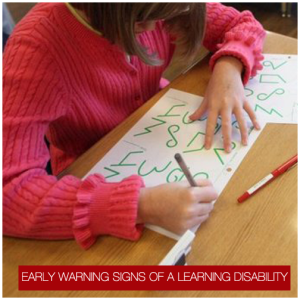 Can I tell if my child has learning disability?
Can I tell if my child has learning disability?
Children till the age of 5 learn skills at different rates. If a child is adept at speaking, he may be slower to comprehend numbers. Similarly, a child who is adept at physical manoeuvres and play may learn the alphabet later than others. This varying rate of learning new skills can throw parents off the correct way to diagnose if there is a problem.
Learning disability falls into 3 wide categories:
Speech and language problems
Reading writing and math problems
Coordination, motor skills and memory problems
However, sometimes the disability is quite apparent such as dyslexia (reading impairment) or dyscalculia (math solving impairment).
What exactly goes wrong in a child with learning disability?
A child with learning disability who has a normal IQ, like any regular child, cant process accurately information that gets passed on from the eyes and ears to the brain. The child knows what he/she wants to accomplish, but can
- « Previous Page
- 1
- …
- 45
- 46
- 47
- 48
- 49
- …
- 65
- Next Page »
